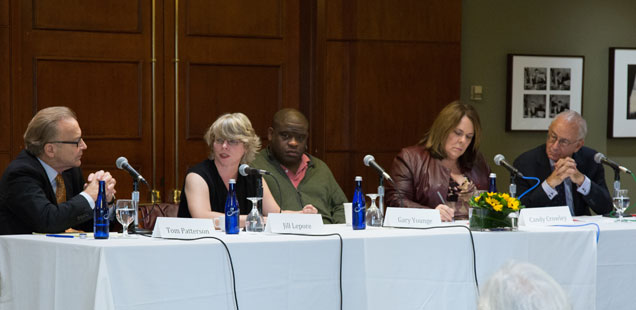2015 Theodore H. White Seminar on Press and Politics

November 6, 2015 — A panel of experts discussed the benefits and drawbacks of polling at the Shorenstein Center, continuing the conversation sparked by the previous night’s Theodore H. White Lecture on “The Press and the Polls,” delivered by Jill Lepore.
Panelists included: Candy Crowley, former anchor and political correspondent, CNN and Fall Fellow, Harvard Institute of Politics; Peter Hart, founder, Hart Research Associates and pollster for NBC News and The Wall Street Journal; Jill Lepore, David Woods Kemper ’41 Professor of American History at Harvard University and staff writer for The New Yorker; and Gary Younge, columnist for The Guardian. The panel was moderated by Thomas Patterson, acting director of the Shorenstein Center and Bradlee Professor of Government and the Press.
Lepore’s lecture had critiqued the polling industry for its flaws, arguing that it even impacted the health of democracy in the U.S.
Hart defended the industry, acknowledging that while change is needed – participation rates are too low, and the public has a poor understanding of public opinion measurement – the data collected by polls is still “exceptionally representative of where the country is at.” Hart argued that polling does not sway public opinion in elections – it measures sentiment rather than influencing it. He cited Vietnam, Watergate, and same-sex marriage as examples of times when public opinion was ahead of politicians, therefore impacting political outcomes. Hart stressed the importance of integrating other forms of data collection, such as focus groups, to understand the “why” behind the numbers.
Crowley also defended the practice of polling. Although she said that horse race numbers are “catnip for political reporters” and that reporters are not always trained to correctly report on polls, there wasn’t a better, readily available way of measuring the nation’s pulse, especially since polling has become a fixture of political reporting. She said that the problem was not the existence of polls, but rather the incorrect use of them.
Younge also agreed that the problem is not polls, but rather a problem with journalism. Using polls alone without digging deeper creates a lazy kind of journalism, he said, one that loses nuance and “texture.” He also compared the U.S. election cycle to that of the U.K, which lasts for only five weeks. With a shorter cycle and less campaign spending, polling and market research is a smaller industry than it is in the U.S.
Lepore responded that she was primarily disavowing horse race polls, and that polling during the Vietnam and Watergate eras was useful. However, in recent years, polling had “teetered off course.” She said the problem is complicated because the public can’t tell the difference between polls with good or bad methodology. Lepore suggested that other methods, such as deliberative polling, whereby people learn about and debate an issue, and are asked for their opinions before and after reflection, could be a more meaningful way of gathering public opinion.
In a question and answer session, the panelists also discussed the role of polling for politicians, generally agreeing that following public opinion polls should not replace true leadership. They also discussed the use of polling for admittance to presidential debates.
Article by Nilagia McCoy of the Shorenstein Center. Photo by Martha Stewart.
